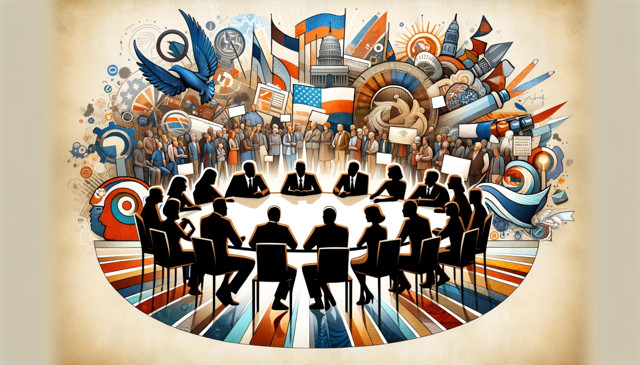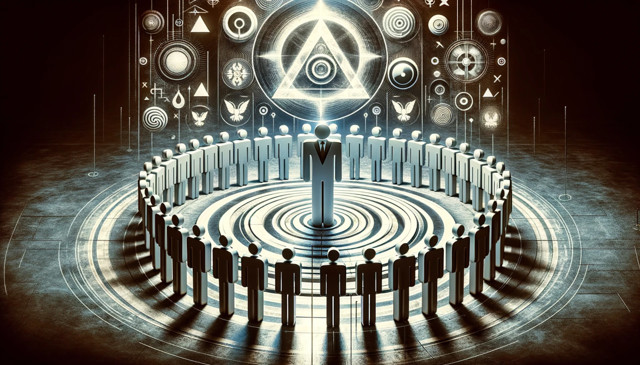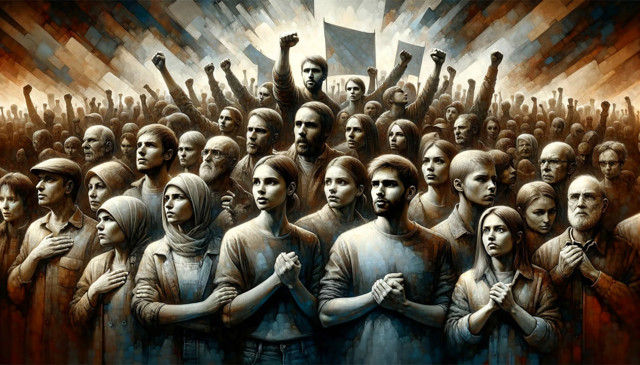June 2024
This article delves into the fascinating parallels between cults and the cult-like devotion seen in political movements, examining the psychological and social dynamics at play. It explores infamous cults like Jonestown and Heaven's Gate and draws intriguing comparisons with the fervent loyalty seen in followers of historic dictators like Hitler and Stalin. This article challenges readers to consider the fine line between free choice and blind allegiance in the realms of politics and power, offering a thought-provoking analysis of the mechanisms that drive such unwavering devotion.
Last updated 20 months ago
Understanding the Cult-like Dynamics in Politics and History
By Monica Granlove

Constructive and respectful dialogue about differing political perspectives is essential for a healthy democratic society. Public opinion is diverse, and it is valuable to engage in nuanced discussions that respect individuals' agency and motivations within the broader political landscape. Before you vote, get to know the candidates.
In media portrayals of cults, political figures rarely take center stage; instead, the focus typically revolves around groups with unconventional beliefs and harmful practices. The Peoples Temple gained notoriety for the tragic mass murder-suicide in Jonestown, Guyana, in 1978, where over 900 followers perished after consuming cyanide-laced fruit punch.
Here are some examples of these groups:
- The Peoples Temple was a cult founded in 1955 by Jim Jones. It started as a religious movement that blended elements of Christianity with socialist and communist ideologies, focusing on racial equality, social justice, and helping the poor. However, as time progressed, it became infamous for its tragic end; the mass murder-suicide that occurred in Jonestown, Guyana, in 1978. More than 900 followers died after drinking cyanide-laced fruit punch.
- Heaven's Gate with its belief in extraterrestrial beings and the idea that followers could attain salvation by boarding an alien spacecraft, made headlines in 1997 when 39 members participated in a mass suicide to reach the purported spacecraft.
- The Branch Davidians an offshoot of the Seventh-day Adventist Church, became infamous for the Waco Siege in 1993. This tragic event concluded with a confrontation between the group and law enforcement.
- The Solar Temple blending Christian elements with New Age philosophy, embraced beliefs in reincarnation and sought to escape to a new life on a mythical planet. Multiple mass suicides marked the cult's activities in the 1990s.
- The Children of God a religious movement, faced allegations of child abuse and exploitation, later rebranding itself as The Family International. These instances illustrate the dark and often tragic dimensions associated with various cults, revealing the disturbing intersections of belief systems and extreme actions.
Cults exhibit distinct features, marked by their unconventional and often extreme beliefs, coupled with leaders who wield substantial control over their members. Typically helmed by charismatic and authoritarian figures, these leaders assert significant influence, often claiming special insight, divine guidance, or unique authority.

To maintain control, cults regularly deploy tactics designed to manipulate the minds of their followers. These strategies encompass various methods, including the isolation of individuals from their friends and family, strict control over information, the application of thought-stopping techniques, and the use of coercive persuasion. Through these means, cult leaders establish a pervasive influence that extends into the psychological and social spheres of their members.
Cults insist on absolute loyalty from their members, discouraging any questioning of the leader's authority or the group's beliefs. Dissent is not only discouraged but often met with punishment, as it is perceived as a threat to the group's unity. In cultivating a groupthink mentality, cults actively promote conformity to their beliefs and practices while discouraging any dissenting opinions, resulting in a closed system that rejects alternative viewpoints. Furthermore, cults tend to develop their unique identity through taglines, symbols, rituals, and language exclusive to the group. These elements play a crucial role in fostering a sense of identity and belonging among members, reinforcing the group's cohesion.
To maintain control, cults may resort to fear tactics, keeping members compliant through the threat of punishment, expulsion, or dire consequences if they question the leader or attempt to leave. This atmosphere of fear serves as a powerful mechanism to manipulate and control the behavior of individuals within the cult.

The phrase "cult-like followers" is commonly employed to characterize an unwavering and fervent allegiance to a political leader. It's crucial to clarify that utilizing the term "cult" in this context doesn't automatically imply that the followers are part of a conventional cult with all the negative associations that term carries. Rather, it underscores the notable level of adoration and loyalty evident in specific political movements. Numerous historical figures serve as exemplars of behaviors often described as "cult-like."
The Timeless Legacy novels intricately weave the narratives of three families against the tumultuous backdrop of war, revealing the profound consequences that unfold when individuals blindly follow charismatic leaders.
Some of the more well-known examples of political leaders with these traits:
- Hitler, as the leader of Nazi Germany, cultivated a strong and fanatical following. His charismatic leadership, persuasive oratory, and the cult of personality around him led to unwavering support from many Germans during the Nazi era.
- Stalin, the leader of the Soviet Union, developed a cult of personality that emphasized his role as a father figure and savior of the nation. Stalin's image was widely propagated, and he fostered a climate of fear and adulation.
- Kim Il-sung, The founder of North Korea established a personality cult that has been carried on by his successors. His image is omnipresent in North Korea, and the ruling family is deified, with a strict and unquestioning loyalty demanded from the citizens. He remains the eternal president of North Korea, even after death.
- Mao, the founding father of the People's Republic of China, had a significant personality cult. His image and quotations were widely disseminated, and Mao's cult of personality played a crucial role during the Cultural Revolution.
- Gaddafi, the former leader of Libya, fostered a cult of personality that included extravagant displays of loyalty and devotion. His Green Book, outlining his political philosophy, was mandatory reading, and Gaddafi's image was omnipresent.
- Saddam Hussein, the former President of Iraq, cultivated a cult of personality. His image adorned public spaces, and loyalty to Saddam was a cornerstone of the political system in Iraq during his rule.
Unsurprisingly, these leaders were, in fact, dictators. A dictator, by definition, is a political leader who wields absolute power and typically governs with rigorous authority, unchecked by democratic processes or legal constraints. These leaders exercise unrestrained authority, exerting significant control over the government, military, and frequently the economy. Their ascent to power often occurred outside democratic processes, leading to the curtailment or elimination of democratic institutions. The suppression of political opposition is a common tactic, involving measures such as censorship, arrests, imprisonment, or even violence, with opposition parties and dissenting voices facing potential bans.
Moreover, certain dictators cultivate a personality cult, promoting their image as central to the state and portraying themselves as indispensable or even god-like figures. This emphasis on personality further underscores the concentrated power and influence wielded by dictators in their respective domains.
Dictatorships typically limit civil liberties, including freedom of speech, assembly, and association. Citizens may have restricted rights and limited political freedoms. Dictators often control or heavily influence media outlets to shape public perception and limit the flow of information that could be critical of the regime. Dictators may stay in power for extended periods, often through the suppression of political opposition, manipulation of electoral processes, or the absence of term limits.
Vote for Democracy: Power in Your Hands

How do we discern the boundaries between embracing freedom of choice and tolerating cult-like behaviors exhibited by individuals aspiring to be dictators or already in authoritative positions? Is it when participation and loyalty reach a level of intensity that becomes unwavering? Or perhaps when individuals unquestioningly accept everything conveyed by the leader as gospel? Could it be when the emphasis shifts from specific policies to the leader's perceived qualities of leadership?
Is it when a leader believes they are beyond the reach of the law? Or does it manifest when followers express profound emotional connections to a leader, often without fully comprehending the underlying messages they receive? Another consideration may be when the leader or their followers outright reject diverse perspectives without genuine understanding. The delineation between freedom of choice and the acceptance of potentially problematic behaviors within such dynamics is a nuanced and critical question to explore.
As people around the world consider their voting choices, I encourage everyone to invest time in comprehending the candidate's conduct and to pose the crucial question: "Do they genuinely prioritize the best interests of our country?"
